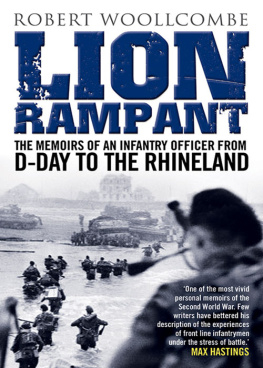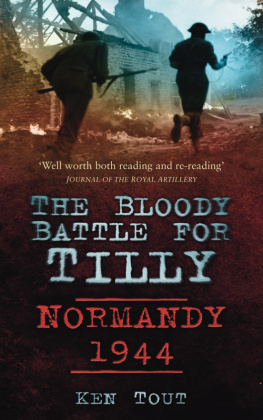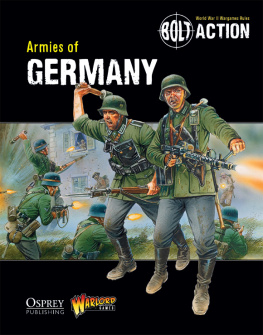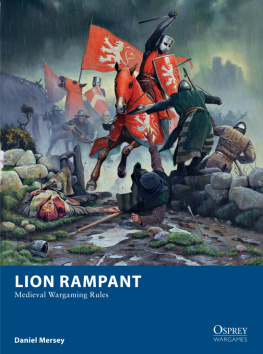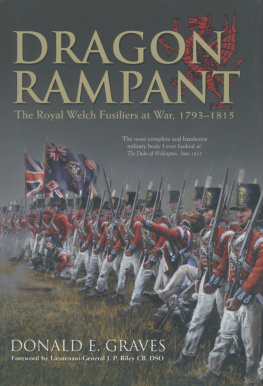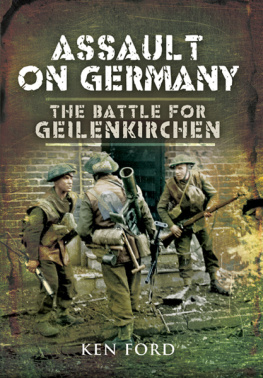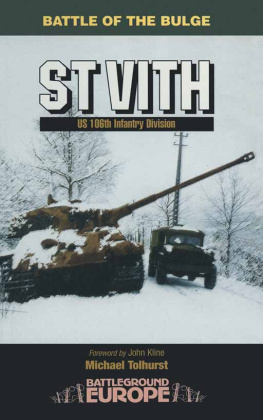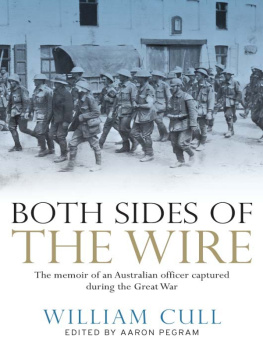Robert Woollcombe - Lion Rampant: The Memoirs of an Infantry Officer from D-Day to the Rhineland
Here you can read online Robert Woollcombe - Lion Rampant: The Memoirs of an Infantry Officer from D-Day to the Rhineland full text of the book (entire story) in english for free. Download pdf and epub, get meaning, cover and reviews about this ebook. year: 2014, publisher: Black White Publishing, genre: Non-fiction / History. Description of the work, (preface) as well as reviews are available. Best literature library LitArk.com created for fans of good reading and offers a wide selection of genres:
Romance novel
Science fiction
Adventure
Detective
Science
History
Home and family
Prose
Art
Politics
Computer
Non-fiction
Religion
Business
Children
Humor
Choose a favorite category and find really read worthwhile books. Enjoy immersion in the world of imagination, feel the emotions of the characters or learn something new for yourself, make an fascinating discovery.
- Book:Lion Rampant: The Memoirs of an Infantry Officer from D-Day to the Rhineland
- Author:
- Publisher:Black White Publishing
- Genre:
- Year:2014
- Rating:4 / 5
- Favourites:Add to favourites
- Your mark:
- 80
- 1
- 2
- 3
- 4
- 5
Lion Rampant: The Memoirs of an Infantry Officer from D-Day to the Rhineland: summary, description and annotation
We offer to read an annotation, description, summary or preface (depends on what the author of the book "Lion Rampant: The Memoirs of an Infantry Officer from D-Day to the Rhineland" wrote himself). If you haven't found the necessary information about the book — write in the comments, we will try to find it.
Robert Woollcombe: author's other books
Who wrote Lion Rampant: The Memoirs of an Infantry Officer from D-Day to the Rhineland? Find out the surname, the name of the author of the book and a list of all author's works by series.
Lion Rampant: The Memoirs of an Infantry Officer from D-Day to the Rhineland — read online for free the complete book (whole text) full work
Below is the text of the book, divided by pages. System saving the place of the last page read, allows you to conveniently read the book "Lion Rampant: The Memoirs of an Infantry Officer from D-Day to the Rhineland" online for free, without having to search again every time where you left off. Put a bookmark, and you can go to the page where you finished reading at any time.
Font size:
Interval:
Bookmark:
T HE British like best to think back on themselves in honourable adversity; but this is a tale of Victory.
In checking certain details of background I have made grateful use of the History of the 15th Scottish Division, by Lieutenant-General H. G. Martin, C.B., D.S.O., O.B.E., and of the war accounts of the brigade and battalion with which I servedFrom Normandy to the Baltic; the Story of the 44th Lowland Brigade, by Ian M. Robertson; and The 6th (Border) Battalion: the Kings Own Scottish Borderers: 19391945, by J. R. P. Baggaley, M.C.
I am grateful also to the late Field-Marshal Viscount Montgomery of Alamein and Messrs Hutchinson & Co. Ltd. for permission to reprint a passage from Normandy to the Baltic (1947); to Her Majestys Stationery Office for permission to quote a sentence from the Report of the Supreme Commander to the Combined Chiefs of Staff on the Operations in Europe of the Allied Expeditionary Force 194445; and to the Illustrated London News for permission to quote an extract from their issue of 17th March 1945.
I T was New Years Eve, 194344. The sergeants were holding a Guest Night in their Mess beyond the round-about in a Yorkshire village on the Great North Road, and the guests were the officers. It was our last normal station in England.
And there was the Regimental Sergeant-Major, that New Years Eve, standing on a table with the Great North Road outside, delivering himself of a genial number with bags o patter. And I remember, shortly before midnight, talking to Colour-Sergeant Macbain, the oldest soldier in A Company. He had just given me another beer and had one himself, and his face was at its reddest, when slowly it dawned on me that nothing he was saying made the slightest sense whatever. He looked as annoyed as he always didhe might have been making out a ration indent. But in his own way, Colour-Sergeant Macbain was comfortably, unnervingly intoxicated.
There were the rest of them from A Company: big Tam MacEwan, my platoon sergeant, among them, with my two fellow platoon commanders. Alastair, a year younger than I, was 8 Platoon. For his age, which was twenty, he was remarkably advanced where the opposite sex were concerned, and he always amazed me. Danny, a much older man but the junior subaltern, was 9 Platoon. Formerly a Territorial Colour-Sergeant, Danny was very dark and had a crackled voice heavily coated with the accent of Hawick. And a little apart was the Company Sergeant-Major, with Gavin, our Company Commander.
Our sergeant-major had two exteriors: Fierce, and Baffled. Too much paper work baffled him, and once in a boxing tournament he had slaughtered his opponent, an unfortunate young private, practically by sheer force of rank and presence, with hardly a blow being struck.
Gavin and Duncan were his only masters. Gavin with the somewhat rugged, pleasant features and the lazy wit; a peacetime soldier on his imperturbable way through the war. And Duncan, Gavins second-in-command. The sweeping, highly strung, noisy, restless, blond big figure of Duncan. For a long time, by wartime reckoning, the A Company officers had been Duncan, myself and a wholehearted schoolboy we called Victor Sylvest, who died in a motorcycle smash. Duncan, a captain, had commandedand one felt he still regarded the Company as his by right.
And then it was midnight. There was some singing and shouting.
Well, Sergeant-Major Well, Woolbags. said Gavin, turning to the sergeant-major and myself in that deliberate way of his. Were going to go through a hell of a battle this year, together.
Yes, sir. A hell of a battle, agreed the sergeant-major, brisk and emphatic, rising to the moment. The more unpleasant a thing was likely to be, the more brisk and emphatic he invariably became. And we all shook hands.
T HE early months of 1944 were merely successive groups of weeks called by recognizable calendar names. Unreality was approaching: there was going to be a Move. None of us quite knew when or where, although in due course the villagers were able to tell us exactly when. They told us about a week before the secret movement orders came through. Meanwhile the old names on the calendar remained, like conventional signs on a strange map.
Soon there was built within the crumbling walls of our grounds a wooden replica of a Landing Craft Assault. It was built in order that every platoon in the Battalion might practise leaping off it on to imaginary beaches in the minimum number of seconds. And there it stood, between A Company huts and the dining-halls, a sort of Trojan Horse that carried us on our journeys over imaginary seas and landed us on shadowy coastlines somewhere beyond the unreality ahead; while at B.H.Q. the large form of Bob Wilson, motor transport technical sergeant, was bent with massive thoroughness, day by day, to the task of ensuring everything the Battalion possessed that moved on wheels could be driven through salt water for as long as the driver kept his neck above the surface.
Then, fast upon us, came the end of all leave, the censorship of mail, and a Brigade dress-rehearsal for the Divisional Commanders inspection and address to the troops. This last was exhaustive, and when two or three were gathered together over a NAAFI tea-counter was frankly regarded as bull.
A few days later the Lowland Brigade were marching on parade in a pleasant park to the familiar lilt of Pibroch of Donhuil Dhuthe gathering of the clans. Until an unreasonable hour the night before the atmosphere in billets had been thick with oaths and blanco. Never had quite such intensive bull been demanded, but the outraged Jock consoled himself with the reflection that it was their last blanking chance.
The Brigade were to be drawn up in three sides of a square. The RoyalsFirst of Footforming the right-flank battalion, the Fusiliers the centre battalion, with the massed pipes and drums in the rear of them, and we the left-flank battalion. In the centre of the square stood a jeep, and upon its bonnet, on a stand, was a microphone. After the inspection, ranks were to be broken and all were to gather round this vehicle and listen to the address. Facing the open side of the square across a small road that led to the parade-ground rose a whitewashed flagstaff, with the Brigade pennant crowning the proceedings at the top.
Suddenly, when the battalions were marching on to the parade, a rumour had issued out of the ground and was among us. Suddenly it was not the Divisional Commander after all who was going to inspect. Rapidly the word spread round, and as soon as the parade was drawn up the Brigadier reached for the microphone on the jeep and made an announcement. The rumour was confirmed. There was a stir.
The time for the expected arrival came and went. Half an hour passed. It was a crisp, sunny March afternoon with a scent of spring behind it, and everything was very still. The assembled ranks in bonnets, tam o shanters, with their gleaming cap-badges and clean, sharply pressed and sun-splashed battle-dresses, waited. Some curious, some cynical, others still muttering about bull or a coarser word.
At length there came into view down the road out of the surrounding trees a lone despatch rider wearing vast driving-gauntlets blancoed a dazzling white, and belt to match. From his handlebars flew the large black-and-white check flag heralding the arrival of a Very Important Person. A short distance behind him came two more outriders, abreast, and then, at a discreet interval, there followed a large black car flying the Union Jack. Behind this there came the Divisional Commanders car, another car flying the Corps Commanders flag, then a carload of pressmen and cameramen, peculiarly out of place, and finally a jeep full of huge, immaculate Military Police. At a sedate pace the small convoy crunched to the flagstaff and stopped. Solitary in the silence came the Brigadiers voice calling the Brigade to attention as car doors slammed. Then the slope arms and a pause of deepest silence, and then the high, lone voice of the Brigadier again. General Salute Present Arms! Three measured movements from three thousand men, and to set the seal on it, the right hand of every officer snapping to his balmoral on the last movement of the rifles. All at once the pipes and drums broke into the first four bars of Scotland the Brave, breaking off on the split second at a final thump from the big drums that cast the parade back with a jolt into a deep silence. Then the order arms, and at last the relief of the stand-at-ease, at which three thousand faces switch like another drill movement to the one direction. Yes! Good heavens. There he was. Precisely as if he had stepped from the
Font size:
Interval:
Bookmark:
Similar books «Lion Rampant: The Memoirs of an Infantry Officer from D-Day to the Rhineland»
Look at similar books to Lion Rampant: The Memoirs of an Infantry Officer from D-Day to the Rhineland. We have selected literature similar in name and meaning in the hope of providing readers with more options to find new, interesting, not yet read works.
Discussion, reviews of the book Lion Rampant: The Memoirs of an Infantry Officer from D-Day to the Rhineland and just readers' own opinions. Leave your comments, write what you think about the work, its meaning or the main characters. Specify what exactly you liked and what you didn't like, and why you think so.

